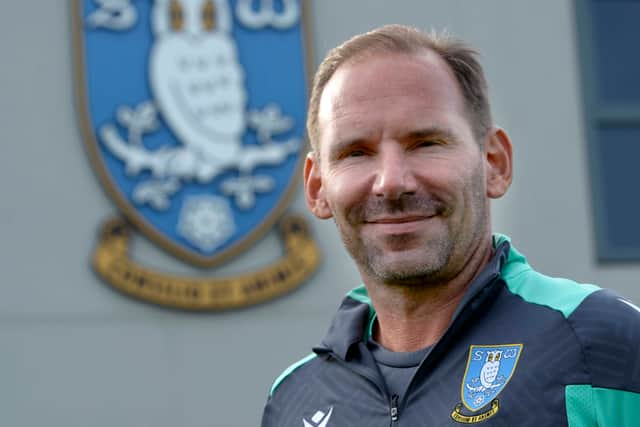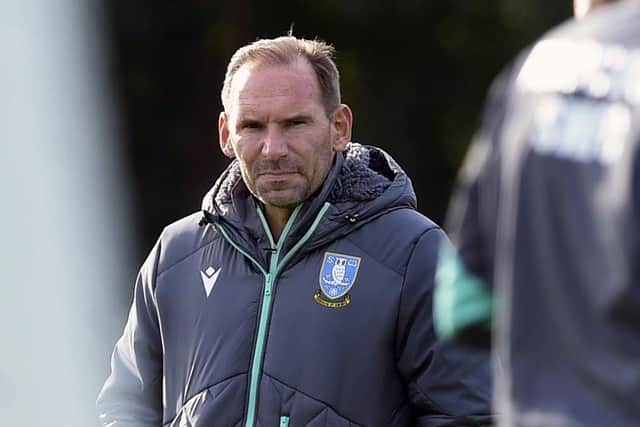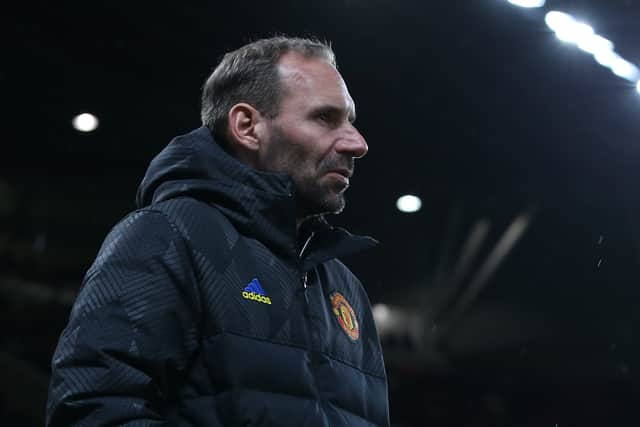“They saw abuse, violence, drugs” Inside the fascinating career of Sheffield Wednesday coach Sascha Lense
and live on Freeview channel 276
The worst start to a league season in their 157 year history. Injuries to key players at key times. The horrors of Huddersfield, 12-point deficits, the spanking of Portman Road. There was misery at Middlesbrough, a rainy cup defeat at Coventry and more recently a draw with Stoke that for many signalled that the game was up.
And yet they’ve come back time and again. More or less every time since Danny Röhl and his coaching staff got things tanking in the right direction, Wednesday have registered a run of results following their nastiest falls.
Advertisement
Hide AdAdvertisement
Hide AdSascha Lense answers a Zoom call from Sheffield Wednesday’s Middlewood Road training ground with a warm demeanour. He smiles widely and dressed in Owls regalia, fresh from a day’s training, sits with open body language. His is an important role at the club, a part-coach-part-psychologist who Röhl has told The Star informs a great deal of his match preparation in terms of the delivery and messages he puts forward to his players.


“Everything off the pitch is psychology,” Lense later advises with a soft German accent. “When a player is not reaching their full potential and there is maybe no technical problem, no injury, this is one of the places I can do my work.”
His is a fascinating life that has spanned teenage stardom and a promising playing career voluntarily cut short, social work with vulnerable teenagers and time at one of the biggest clubs in the world.
Here’s how we spent a fascinating hour with Sheffield Wednesday secret weapon Sascha Lense.
Advertisement
Hide AdAdvertisement
Hide Ad“You don't need a crystal ball..”
It was Friday the 13th and the mood around S6 leading into that October afternoon had been suitably ghoulish.
Things were not going well. Sheffield Wednesday were winless, hapless and joyless, seemingly destined for League One and spinning from a summer of madness. Assembled in the swanky Guest Lounge of Hillsborough’s South Stand were members of the local media, waiting to meet unknown German coach Danny Röhl for the first time as part of his unveiling as Owls boss.
A door opened to cut through the chit-chat and through it came Röhl, instantly recognised from media reports in the week previously. He turned not left towards the table and chairs set up to facilitate his press conference but right, making a beeline towards the hacks and camera operators. He shook every hand in the room in a tradition still undertaken in Röhl post-match press conferences around the country.
With him was a man of mystery. The figure we now know as Sascha Lense followed Röhl into the room and did the same, shaking hands firmly and smiling with eye contact. Where other members of staff would be confirmed in the coming weeks - two intended additions fell by the wayside - Lense was one of Röhl’s men from day dot, having known him from a decade or more earlier from their shared experience in the set up at RB Leipzig. It was an appointment made simpler by Lense’s recent work at Manchester United and the work permit he would have already held, but the message was that he was going to be an important figure.
Advertisement
Hide AdAdvertisement
Hide AdHaving worked with Red Bull, with Schalke 04 and at Manchester United, it was an impressive signing for a club whose start to the season pointed in only one miserable direction. In his chat with The Star, Lense spoke about the size and tradition of Wednesday - along with the opportunity to take on a dual role - as reasons for his switch to South Yorkshire. But above all was the opportunity to climb on board with Danny Röhl.
“This felt special because it was Danny, an old friend and one with high potential as someone who can be the next big manager in England or in Germany,” Lense said. “After what he had done as an assistant, you don't need a crystal ball to tell he can be the next go-to guy.”
Their relationship goes back to the some of the earliest days of Röhl’s coaching journey, following the younger man's rapid rise through the ranks of RB Leipzig’s youth ranks to the first team set-up. Lense doesn’t remember the very first meeting with an early-20s video analyst, but he certainly remembers the impression he made on him.
“We had two analysts at that time with Red Bull. It was very new to for me to have that and I was immediately surprised at what such a high level they worked,” he said. “I didn't know how much they could go into detail with analysis, but they had created their own system and everything was connected.
Advertisement
Hide AdAdvertisement
Hide Ad“They had certain categories and it was a very sophisticated, high standard system of knowledge. They were saying things that led to decisions over how we train, the assistant coaches worked so closely with them and that informed the whole thing, how they prepared for the next game.
“At this time he was an analyst and so young, it was not so apparent that he would become the next German manager in the Championship. His role changed in the club as things went on, he went from video and then onto the pitch as an assistant. It was immediately obvious that he wanted to work more with the players on the pitch than in the video department. Maybe after six months it became clear he could become something big.”
“They saw abuse, violence, drugs, everything..”
“As a kid, it is your dream,” says Lense with an air of wistfulness, thinking back to a youth playing football as a solid, energetic and technically able midfield player who earned youth caps for his country. He breaks into a grin. “We played against England at under-15 level with thousands at the Olympic Stadium and I scored the goal! I made myself unavailable to my parents for a whole year after I scored in front of 65,000 - I became a horrible kid!”
It’s clear Lense is kidding even before he breaks into a guffawing laugh and a few minutes into the interview it’s hard to imagine the now 48-year-old as anything other than a polite, humble young man. Wednesday players have spoken a number of times in recent months about the importance of how respectful the club’s coaching staff have been with them and have made reference to the personal touches that have made a difference in their resurgence.
Advertisement
Hide AdAdvertisement
Hide AdAs the psychologist in the coaching team, Lense will sometimes have one-to-one talks with players. He has built up relationships across his time at the club. But it’s only 10 years ago he was barely involved in football at all having stepped away from a playing career that bounced between the German second and third tier at the age of 26. There was no career-ending injury or crushing release. His passion back then - and now - lies in helping people.


“I retired relatively early, I was going between the second and third leagues,” he said. “At this time I already had two girls and I knew that when you are at that level, the money is not enough for the long term. I also had a passion for helping people. I loved it but I had to do something after my career and once I knew that, I didn't want to have to wait until I was 38 to start again. The best jobs after your football require a long wait through college or university, so there was no time to waste when my decision was clear. I wanted to do it as quickly as possible.”
Lense enrolled at Technische Universität Dresden (TUD), known as the number one university in Germany for studying psychology and ranked in the top 200 universities globally to this day. He enjoyed the demands of learning and set out on a journey that would end with him becoming a psychologist for troubled teenagers. He describes his past life in glowing terms, his passion for that world clear. It was a professional world he would inhabit for a long time. He remains the co-owner of Leos, a social care facility in Dresden that cares for young people.
“I was not initially sure if I wanted to do psychology,” he said. “I was also considering social work, which I learned from my mother, who worked for a long time in a youth welfare department. It felt like that was my job, I had worked with teenagers in football and sometimes they were a little bit lost. I thought maybe I could help them find a way to help them out of their path. I don't know why I landed on psychology, all I knew was that I wanted to work helping teenagers.
Advertisement
Hide AdAdvertisement
Hide Ad“Everything that they saw in life was deep,” he says, face narrowing with a sense of seriousness. “They saw abuse, violence, drugs, everything. It was a good job, challenging but satisfying.”
“I became their guy..”
Just as fate had a hand in Danny Röhl’s ascension to high-level professional football when Red Bull pulled into Leipzig on the lookout for talented young coaches, Lense’s step back into the game also came courtesy of a sliding door or two.
Happy in his work in psychology and social care for vulnerable teenagers, he had retired from playing in 2006 and was years into life away from the game when the German football authorities laid on a shake-up of how things were done at club level.
“The German football association had a major re-build,” he said. “Every Bundesliga club had to have an academy and every year each academy was given a ranking and points for which they would receive money. One point was given on whether they had a sports psychologist or social worker.
Advertisement
Hide AdAdvertisement
Hide Ad“So Dresden asked me and I made clear if we were going to do it, we had to do it properly. I became their guy and from there I got some interesting offers from different sports because in sports psychology it is not very often that the person doing it is a former professional athlete, that helped me a little bit. Perhaps it made them think I was better than I was!”
From there came the Red Bull link - where he graduated to the important role of team co-ordinator and was Ralf Rangnick’s right-hand man as Leipzig rose through German football apace. He counts Norwich City boss David Wagner as a close friend having performed a similar role at Schalke and in 2021 re-joined Rangnick at Manchester United, where he worked as a sports psychologist to the likes of Cristiano Ronaldo.


“Sascha is always a key part of things,” Röhl told The Star earlier this month. “He helps me to prepare the game. I write the match plan on the tactical side and he helps me to write a match plan from the psychologist side. It is so important which message we give the players. He speaks with the players, these are things you cannot always see, but it is important he is always there around the team.”
Now, he’s on board as a key figure in Danny Röhl’s swiss-army knife Wednesday backroom staff. Neil Thompson is a long-time Owls mainstay who provides a link between club, academy and seniors. Henrik Pedersen is Röhl’s tactical soundboard and takes on much of the coaching, while Chris Powell brings vast experience of English football. Sal Bibbo takes the goalkeepers. Lense is a key figure that is involved on the grass but informs so much of his young friends’ approach away from the technical side of preparation.
Advertisement
Hide AdAdvertisement
Hide AdLense said: “We have a different group of assistant managers and what is good is that each of us bring a little bit of our own profession and experience into the team. We can help the players from different directions and that is what I like here.”
It’s a carefully-chosen mix. And with Wednesday sat midtable in the time since it was put together, it’s one that is working. With two matches remaining and every chance of survival, it’s one that might just pull off something remarkable.
"Everything off the pitch is psychology."
Sascha Lense will continue to play an integral part in the final push.